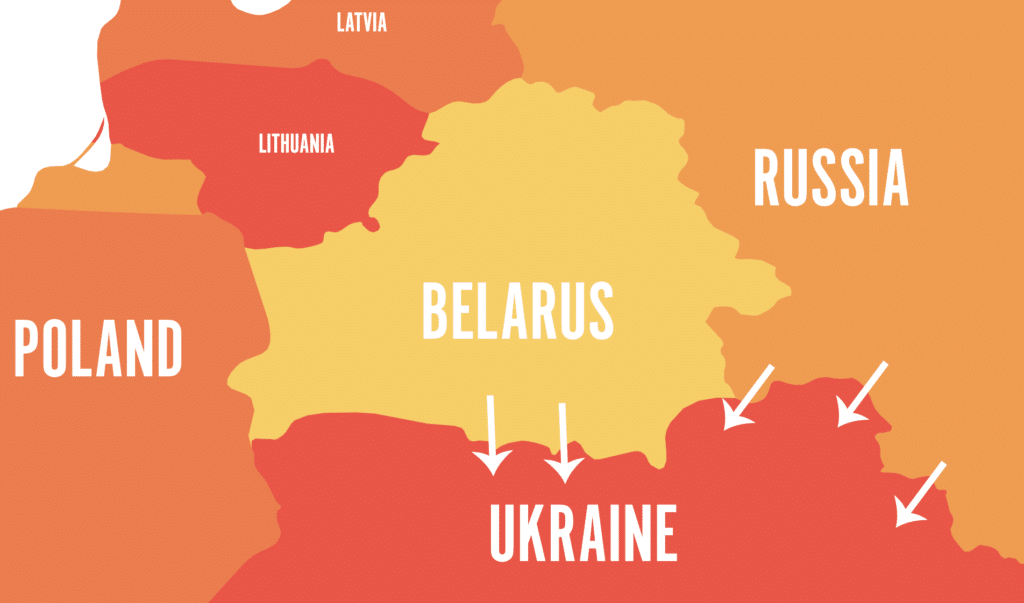

Devstars
Blog
Date: 10/12/2023
Stuart WatkinsDevstars had planted its digital roots in Belarus for years, harnessing the cutting-edge innovation and tech-savvy ethos that thrived within Minsk. We were inspired by the vibrant, growing web development sector and its potential for technological breakthroughs and bolstering economic growth. Minsk was more than a business location. It was a central chapter in the Devstars story, where our team members collaborated, innovated, and thrived.
While one of our team was beaten by riot police after the previous election, the winds of change began to gust in the wake of the 2020 Belarusian presidential election, blowing us towards an unavoidable pivot. The ensuing political unrest and atmosphere concerned our team’s safety and well-being.
One of our web developers donated to an opposition party. A gesture that now carried the weighty consequence of arrest upon re-entry. For many of our colleagues, the circumstances surrounding Belarus’ stance on Ukraine grew increasingly dire and impossible to support, prompting difficult decisions and personal consequences.

In solidarity with our team and in response to the escalating situation, Devstars embraced decentralisation. Our team members have dispersed across various European cities, embodying the resilience and adaptability at the core of our mission. We have woven a new multi-city tapestry that enriches our collective experience and expertise, with each location offering a unique perspective and opportunity for growth.
As we settled into this dispersed structure, our bonds with Ukraine strengthened.
Our commitment to supporting our teams there has never wavered. In these times of global uncertainty, we stand proud of our connection to Ukraine and our dedication to the well-being of our team members. At Devstars, we see these challenges as trials and a testament to our collective strength and the unwavering spirit of innovation that underpins everything we do.
The seed of Minsk’s transformation was sown with the establishment of the Hi-Tech Park (HTP) in 2005 – an initiative that positioned the country as a veritable Silicon Valley of Eastern Europe. With preferential tax conditions and a favourable business environment, HTP became the crucible of technological advancement, nurturing startups and established companies alike.

The Belarusian IT industry’s trajectory took an unexpected turn following the controversial 2020 presidential election and subsequent events. The disputed election results sparked widespread protests, some led by figures within the IT sector.
This unrest, coupled with Belarus’ support of Russia’s invasion of Ukraine and ensuing international sanctions, has led to an exodus of programming talent and companies from Belarus, seeking stability and favourable working conditions elsewhere.
The brain drain from migration has profound implications. The HTP and the Belarusian IT sector have experienced remarkable growth. With export values tripling and domestic market sales multiplying, the current geopolitical climate poses significant challenges. Companies that once thrived under the HTP’s beneficial conditions are now relocating. Driven by external pressures and the need to maintain financial and operational stability in a global market.
The question now is: what does the future hold for the Belarusian IT industry? Despite recent setbacks, there are still opportunities for growth and innovation. The government’s commitment to advancing the IT sector remains steadfast, with efforts to adapt to the changing geopolitical landscape. The focus is shifting towards consolidating the domestic market, exploring new international partnerships, and enhancing the legal regime to provide greater support to resident companies.
The political turmoil following the disputed 2020 election and the impact of Ukraine war sanctions have led to a significant exodus of web development professionals and companies from Belarus. This situation has major implications for the Belarusian economy, especially considering the web development sector’s critical role.
Before the election:
The post-election crackdown led to safety concerns and internet disruptions. Many web development professionals and companies to consider or actively pursue relocation to other countries.
For instance, Ukraine emerged as a prime destination for these IT specialists, with Ukraine introducing measures to facilitate relocation. Other destinations for Belarusian devs include Russia, Cyprus, and Poland, each offering various incentives to attract this skilled workforce.
The departure of these IT companies and professionals threatens to undermine Belarus’s status as a competitive outsourcing destination. The loss of a highly skilled workforce, driving the most dynamic part of the Belarusian economy, presents a big challenge. The political unrest and subsequent exodus of talent could lead to a long-term impact on the country’s ability to restore its competitive advantage and repair its reputation in the eyes of the global investment community.
Viber closed its offices in Minsk due to the situation, & Godel, a British IT company, relocated its team to Ukraine. The overall trend suggests a substantial shift in the Belarusian IT landscape, with potential long-term economic consequences for the country.
In summary, the departure of IT professionals and companies from Belarus following the 2020 election and subsequent sanctions is likely to significantly impact its economy, particularly given the important role this sector played in the country’s economic landscape.
These insights were drawn from various sources, including articles from the Atlantic Council, POLITICO, Global Counsel, and Radio Free Europe/Radio Liberty.
The current state of Web Development in Minsk underscores the need for businesses to stay informed and adaptable. As the global political and economic scenarios evolve, companies must weigh the risks & opportunities of outsourcing to regions like Belarus. Today, informed decision-making and ethical considerations will be key to navigating the complexities of the global IT industry.
On a personal level, we have worked, played and built up relationships with team members in both Belarus and Ukraine. Our hearts go out to them as they struggle to live amidst the madness of totalitarian regimes and wars. Both countries’ future lies in fate’s hands, and we pray for a peaceful end and a return to normality.
Send us a brief message outlining
your project and we’ll get back to
you asap to discuss your project
in more detail.